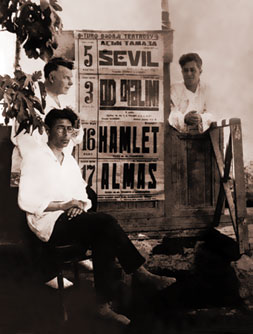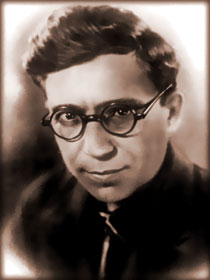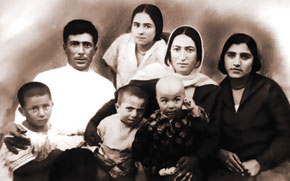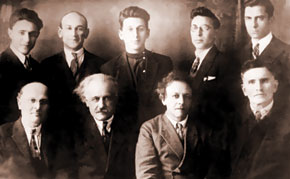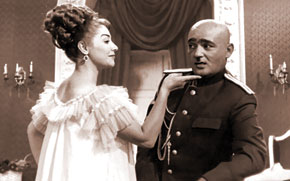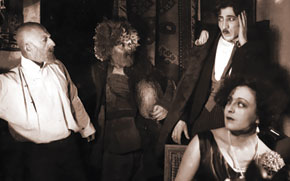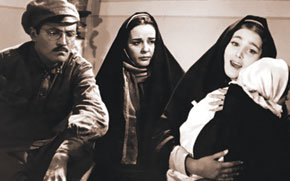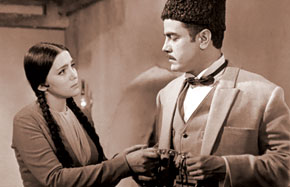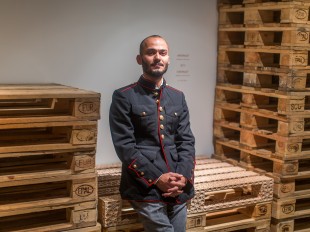Pages 76-81
by Aydin Kazim-Zadeh
The great Azerbaijani writer and playwright, poet and translator, theatre and cinema worker, screenwriter and director, Honoured Art Worker of the Republic, Jafar Jabbarli (1899-1934), was one of our most talented and productive artists. More than 70 years have passed since his too-early death, but still his works are read with great pleasure, his plays are staged, films based on his works are shown, and all aspects of his broadly creative life are studied.
It is no coincidence that Jabbarli is likened to Maxim Gorky’s hero Danko. To light the way for his people, Danko pulls his fiery heart out of his chest and holds it over his head. Jabbarli similarly blazed a trail for both his heroes and his contemporaries with any number of literary and social works. The beam of his light still illuminates our path and will continue to shine.
Jabbarli’s main focus was on the theatre and he achieved great success there. Such works as ‘Baku War’, ‘Devoted Sariyya or, laughter within tears’, ‘Shah Hasreddin’, ‘Bride of Fire’, ‘Sevil’, ‘Almaz’ and others gained widespread fame among readers and viewers. He was also committed to cinema. He believed in the development and future success of the art of this new art, and he did not spare his talent or skill for such an important medium. Thus, side by side with his theatre work, he was at the script department of the film studio writing scripts for movies and then studying film directing.
Jabbarli’s cinema activity developed in three directions. Firstly, he tried to draw in local talent. He said: “Only a national team can give a face to Azerbaijani cinema”. The director, Mikayil Mikayilov, who was brought to cinema by the great playwright, recalled his work with Jafar in this way: “Jafar always encouraged us and told us that there was nothing to worry about. We would do a lot of work in our film studio”.
Women to the fore – Sona...
The second direction involved the writing of scripts for movies. He was the first Azerbaijani screenwriter. Freedom for women, the position of women in society, is the main theme running through his plays and scripts. His first script was ‘Sona’ (the screen version of ‘Haji Gara’). He wrote a screenplay from ‘Haji Gara’, a play by the founder of Azerbaijan’s classical drama, Mirzah Fatali Akhundov; practically rewriting the play in the process.
He replaced the eponymous hero by Sona as the leading character. Thus he touched on the question of the place and position of women in society and accentuated the idea that women have the right to live and freely express their own opinions. While ‘Sona’ was shooting he released a cinema work called ‘Sevil’. He had written the screenplay from his own play of the same name.
...Sevil
‘Sevil’ was a melodrama. It makes clear use of the triangle peculiar to this genre: Balash, a man who had been promoted to be manager of a bank; Sevil, a beautiful woman who obeyed her husband unquestioningly and Dilbar, Balash’s jovial and carefree mistress, made up the eternal false triangle. There is a critical portrayal of Balash, who disliked his past, repudiated traditions and customs and turned away from his own father.
The tough life and longings of Sevil are described in the film as well as in the play. Also reflected is the young woman’s ability to keep pace with life, even when caught up in the whirl of social and political events, and her transformation into an active fighter for a new life.
The film’s director said this about his work with the screenwriter: “Jafar Jabbarli is a great screenwriter, a poet and also a skilful director, with great artistic sensibility. I have to say that there was no shot on which Jafar Jabbarli did not work with me. We would sit and think for hours about how to make shots more lively and convincing. Although he had worked in the cinema for only a short time, his ability to make appropriate decisions actually amazed me. Thus it was a great pleasure to work on ‘Sevil’.” This memory points to the third direction of Jabbarli’s cinema activity - directing. He was a second director on the film ‘Sevil’. We understand this from the recollections of Jabbarli’s wife, Sona khanim and Izzat Orujova and Aghasadig Geraybeyli who played Sevil and Balash respectively.
Orujova remembers that Jabbarli participated in the film shooting alongside the director, she wrote: “Jafar was very exacting. He insisted on repeating shots that he did not like many times. I will never forget it. The scene where Sevil takes off her veil was shot over and over again. But Jabbarli was never satisfied. Each time he clapped his hands, saying:
- No, Izzat, not like that. You are taking the veil off in a very artificial way. It is the culmination of the play. The veil removing scene must provoke the viewer’s rage against the veil - the embodiment of obscurantism and superstition.
We could not get the shot on that day. At home, remembering Jabbarli’s words, I put on my mum’s veil and rehearsed the scene repeatedly in front of the mirror. Once, my mum, seeing this scene, took her veil and shouted at me:
- Have you gone crazy, girl? How many times must you put it on and throw it onto the floor? It is nearly torn...
Finally, the shooting of ‘Sevil’ was finished and it was released. On the day the film was shown many Azerbaijani women took off their veils forever. One of the women who took off the veil that day was my mum. Jabbarli told her, jokingly:
- Auntie Rubaba, Izzat was tearing the veil because she knew that you were going to take it off.
After Sevil I played the role of Almaz. Unfortunately, pitiless death did not allow the great man to see ‘Almaz’ on the screen”.
The famous stage and screen actor, Aghasadig Geraybeyli, also talked about the great master’s cinema work: “Jafar Jabbarli worked very hard in both theatre and cinema. He was writing scripts and looking for actors to perform in films. In those times there were no local personnel. Actors were invited from Russia. Jafar said that these people were only in Baku temporarily. We had to use them while they were working in our studio and learn the refinements of cinema.
In 1928 the State Cinema of Azerbaijan (“Azdovletkino”) released the film ‘Sevil’. We were all interested in the screen version of the play. I had already played the Balash role onstage. It was said that I played well. Jafar himself was selecting the actors for ‘Sevil’. One day he saw me in the theatre and said:
- Aghasadig, please, come to the studio tomorrow. I am thinking of filming you, Rza Afganli (then he listed some more names but I don’t remember), actually one of you, for the Balash role. We’ll see! It depends on how you manage the test shooting. Afterwards I went to Tbilisi for guest performances with the theatre. One evening I received a wire from Jafar. He wrote that I had been approved for the Balash role...
I still remember that before the first shooting on ‘Sevil’, during a rehearsal, Jafar gave me advice on my role and said:
- Aghasadig, for Balash, Sevil is a helpless woman who sits in a corner of her home and obeys the husband without question. Balash, who was a bank worker but is now a bank manager, thinks that his wife should not be an illiterate woman who cooks bozbash (stew), but a lady from a noble family, high society... Your Balash must be seen like this on the screen.
I remember this because, in fact, Jafar was a second director during the production of ‘Sevil’. Actually we all saw him as a production director”.
...and Almaz
In 1934 the screenwriter, inspired by the success, first of the play and then of the film of ‘Sevil’, wrote a screenplay for ‘Almaz’ from his own play of the same name. He decided to direct the film himself, prepared the direction script and collected his creative team. The roles were divided between an excellent group of masters of the stage. He gave the role of Almaz to Izzat Orujova and his niece Malak played Yakhshi. He even chose the location for shooting. The shooting was to be done in the village of Dedegunesh, in Shemakha district.
However, a few days before the New Year, Jabbarli began to suffer heart pains at the studio and was quickly taken home. Some days later, at 5am on 31 December 1934, the prominent artist passed away, just as his creativity was blossoming. Jabbarli’s death was an irreparable loss to Azerbaijani literature and theatre, and particularly to the cinema.
However, his dreams did not remain unfinished. His friends, colleagues and followers continued his cinema work. This creative team, consisting of directors Agha Rza Guliyev and Grigory Braginsky, and cameramen Ivan Frolov and Asger Ismayilov completed the shooting of ‘Almaz’. The film was released at the commemoration of Jabbarli’s death.
One of the film cameramen, Asger Ismayilov wrote: “The film is ready. Employees of ‘Azercinema’ (“Azerkino”) have completed the work started by their dear co-worker and friend, Jafar Jabbarli, with dignity”.
Almaz, unlike Sevil, does not have to look for her path through life. Her path is clear and her aim is sure from the start. That is why she is not frightened and does not step back when she collides with the kulak, Haji Ahmad. She is the herald of a new life and fights with the kulaks, the mullahs and their undeveloped and ignorant helpers; she actually sparks a revolution in the village, struggles and wins.
Almaz is not satisfied with simply teaching in the village. She decides to open a carpet cooperative in order to help rural women. There are some who help Almaz, but there are also some who impede her. Almaz is forced to fight with the Haji Ahmeds, in other words with those who cling blindly to the old regulations and don’t want to release them.
Almaz, faced with such problems, is not afraid of the attacks made against her and does not give up. She does not lose courage; on the contrary, she stands boldly against any resistance. Even though Izzat Orujova, who plays Almaz, is deprived of words, she conveys the heroine’s feelings and emotions with her gestures.
While tracking the difficult and honourable life of the young teacher Almaz, it is clear that the writers tried to avoid any exaggeration in order to achieve a naturalness and reality in the events and images in the film and to reliably transmit the thoughts and emotions of the heroes to the audience. Close-ups, sharp editing and, finally, the combined efforts of directors and actors, made the film an attractive spectacle.
The work goes on
40 years after the 1929 release of the melodrama ‘Sevil’, it was decided to shoot the film-opera ‘Sevil’, by composer Gara Garayev, at the Jafar Jabbarli ‘Azerbaijanfilm’ studio.
The film-opera was produced in 1970. Motifs from Jafar Jabbarli’s play were used in the film. The fate of an Azerbaijani woman who rebels against ignorance and tries to find her place in life is as central to the film-opera as it is to the play. This film was the first film-opera in the history of Azerbaijani cinema and the first cinematographic opera in the history of the Soviet cinema to be devoted to a modern theme.
Instead of making speeches here and there as some did, Jabbarli worked quietly for the development of Azerbaijani culture: he created a dramaturgy for Azerbaijan, worked hard writing plays for the theatre, as a founder of the nation’s cinematography he wrote film scripts, he worked as a director in theatre as well as in cinema. His bent for the cinema was not just some inclination. He was devoted to it. He believed in a great future for cinema. At the same time he did not abandon theatre. He worked extremely hard for the development of both. His absence from the theatre, cinema and cultural life as a whole is still perceptible. And it will be perceptible tomorrow, because genuine artists are eternal, and this applies to the genius of Jafar Jabbarli.
As a token of love and honour, a monument to Jafar Jabbarli was erected on the premises of the film studio in 1980.
Azerbaijan’s cinema workers have studied the life and work of the prominent author and screenwriter and have, over the decades, produced many documentaries about him, including “An Unfading Spring” (1979).
by Aydin Kazim-Zadeh
The great Azerbaijani writer and playwright, poet and translator, theatre and cinema worker, screenwriter and director, Honoured Art Worker of the Republic, Jafar Jabbarli (1899-1934), was one of our most talented and productive artists. More than 70 years have passed since his too-early death, but still his works are read with great pleasure, his plays are staged, films based on his works are shown, and all aspects of his broadly creative life are studied.
It is no coincidence that Jabbarli is likened to Maxim Gorky’s hero Danko. To light the way for his people, Danko pulls his fiery heart out of his chest and holds it over his head. Jabbarli similarly blazed a trail for both his heroes and his contemporaries with any number of literary and social works. The beam of his light still illuminates our path and will continue to shine.
Jabbarli’s main focus was on the theatre and he achieved great success there. Such works as ‘Baku War’, ‘Devoted Sariyya or, laughter within tears’, ‘Shah Hasreddin’, ‘Bride of Fire’, ‘Sevil’, ‘Almaz’ and others gained widespread fame among readers and viewers. He was also committed to cinema. He believed in the development and future success of the art of this new art, and he did not spare his talent or skill for such an important medium. Thus, side by side with his theatre work, he was at the script department of the film studio writing scripts for movies and then studying film directing.
Jabbarli’s cinema activity developed in three directions. Firstly, he tried to draw in local talent. He said: “Only a national team can give a face to Azerbaijani cinema”. The director, Mikayil Mikayilov, who was brought to cinema by the great playwright, recalled his work with Jafar in this way: “Jafar always encouraged us and told us that there was nothing to worry about. We would do a lot of work in our film studio”.
Women to the fore – Sona...
The second direction involved the writing of scripts for movies. He was the first Azerbaijani screenwriter. Freedom for women, the position of women in society, is the main theme running through his plays and scripts. His first script was ‘Sona’ (the screen version of ‘Haji Gara’). He wrote a screenplay from ‘Haji Gara’, a play by the founder of Azerbaijan’s classical drama, Mirzah Fatali Akhundov; practically rewriting the play in the process.
He replaced the eponymous hero by Sona as the leading character. Thus he touched on the question of the place and position of women in society and accentuated the idea that women have the right to live and freely express their own opinions. While ‘Sona’ was shooting he released a cinema work called ‘Sevil’. He had written the screenplay from his own play of the same name.
...Sevil
‘Sevil’ was a melodrama. It makes clear use of the triangle peculiar to this genre: Balash, a man who had been promoted to be manager of a bank; Sevil, a beautiful woman who obeyed her husband unquestioningly and Dilbar, Balash’s jovial and carefree mistress, made up the eternal false triangle. There is a critical portrayal of Balash, who disliked his past, repudiated traditions and customs and turned away from his own father.
The tough life and longings of Sevil are described in the film as well as in the play. Also reflected is the young woman’s ability to keep pace with life, even when caught up in the whirl of social and political events, and her transformation into an active fighter for a new life.
The film’s director said this about his work with the screenwriter: “Jafar Jabbarli is a great screenwriter, a poet and also a skilful director, with great artistic sensibility. I have to say that there was no shot on which Jafar Jabbarli did not work with me. We would sit and think for hours about how to make shots more lively and convincing. Although he had worked in the cinema for only a short time, his ability to make appropriate decisions actually amazed me. Thus it was a great pleasure to work on ‘Sevil’.” This memory points to the third direction of Jabbarli’s cinema activity - directing. He was a second director on the film ‘Sevil’. We understand this from the recollections of Jabbarli’s wife, Sona khanim and Izzat Orujova and Aghasadig Geraybeyli who played Sevil and Balash respectively.
Orujova remembers that Jabbarli participated in the film shooting alongside the director, she wrote: “Jafar was very exacting. He insisted on repeating shots that he did not like many times. I will never forget it. The scene where Sevil takes off her veil was shot over and over again. But Jabbarli was never satisfied. Each time he clapped his hands, saying:
- No, Izzat, not like that. You are taking the veil off in a very artificial way. It is the culmination of the play. The veil removing scene must provoke the viewer’s rage against the veil - the embodiment of obscurantism and superstition.
We could not get the shot on that day. At home, remembering Jabbarli’s words, I put on my mum’s veil and rehearsed the scene repeatedly in front of the mirror. Once, my mum, seeing this scene, took her veil and shouted at me:
- Have you gone crazy, girl? How many times must you put it on and throw it onto the floor? It is nearly torn...
Finally, the shooting of ‘Sevil’ was finished and it was released. On the day the film was shown many Azerbaijani women took off their veils forever. One of the women who took off the veil that day was my mum. Jabbarli told her, jokingly:
- Auntie Rubaba, Izzat was tearing the veil because she knew that you were going to take it off.
After Sevil I played the role of Almaz. Unfortunately, pitiless death did not allow the great man to see ‘Almaz’ on the screen”.
The famous stage and screen actor, Aghasadig Geraybeyli, also talked about the great master’s cinema work: “Jafar Jabbarli worked very hard in both theatre and cinema. He was writing scripts and looking for actors to perform in films. In those times there were no local personnel. Actors were invited from Russia. Jafar said that these people were only in Baku temporarily. We had to use them while they were working in our studio and learn the refinements of cinema.
In 1928 the State Cinema of Azerbaijan (“Azdovletkino”) released the film ‘Sevil’. We were all interested in the screen version of the play. I had already played the Balash role onstage. It was said that I played well. Jafar himself was selecting the actors for ‘Sevil’. One day he saw me in the theatre and said:
- Aghasadig, please, come to the studio tomorrow. I am thinking of filming you, Rza Afganli (then he listed some more names but I don’t remember), actually one of you, for the Balash role. We’ll see! It depends on how you manage the test shooting. Afterwards I went to Tbilisi for guest performances with the theatre. One evening I received a wire from Jafar. He wrote that I had been approved for the Balash role...
I still remember that before the first shooting on ‘Sevil’, during a rehearsal, Jafar gave me advice on my role and said:
- Aghasadig, for Balash, Sevil is a helpless woman who sits in a corner of her home and obeys the husband without question. Balash, who was a bank worker but is now a bank manager, thinks that his wife should not be an illiterate woman who cooks bozbash (stew), but a lady from a noble family, high society... Your Balash must be seen like this on the screen.
I remember this because, in fact, Jafar was a second director during the production of ‘Sevil’. Actually we all saw him as a production director”.
...and Almaz
In 1934 the screenwriter, inspired by the success, first of the play and then of the film of ‘Sevil’, wrote a screenplay for ‘Almaz’ from his own play of the same name. He decided to direct the film himself, prepared the direction script and collected his creative team. The roles were divided between an excellent group of masters of the stage. He gave the role of Almaz to Izzat Orujova and his niece Malak played Yakhshi. He even chose the location for shooting. The shooting was to be done in the village of Dedegunesh, in Shemakha district.
However, a few days before the New Year, Jabbarli began to suffer heart pains at the studio and was quickly taken home. Some days later, at 5am on 31 December 1934, the prominent artist passed away, just as his creativity was blossoming. Jabbarli’s death was an irreparable loss to Azerbaijani literature and theatre, and particularly to the cinema.
However, his dreams did not remain unfinished. His friends, colleagues and followers continued his cinema work. This creative team, consisting of directors Agha Rza Guliyev and Grigory Braginsky, and cameramen Ivan Frolov and Asger Ismayilov completed the shooting of ‘Almaz’. The film was released at the commemoration of Jabbarli’s death.
Almaz, unlike Sevil, does not have to look for her path through life. Her path is clear and her aim is sure from the start. That is why she is not frightened and does not step back when she collides with the kulak, Haji Ahmad. She is the herald of a new life and fights with the kulaks, the mullahs and their undeveloped and ignorant helpers; she actually sparks a revolution in the village, struggles and wins.
Almaz is not satisfied with simply teaching in the village. She decides to open a carpet cooperative in order to help rural women. There are some who help Almaz, but there are also some who impede her. Almaz is forced to fight with the Haji Ahmeds, in other words with those who cling blindly to the old regulations and don’t want to release them.
Almaz, faced with such problems, is not afraid of the attacks made against her and does not give up. She does not lose courage; on the contrary, she stands boldly against any resistance. Even though Izzat Orujova, who plays Almaz, is deprived of words, she conveys the heroine’s feelings and emotions with her gestures.
While tracking the difficult and honourable life of the young teacher Almaz, it is clear that the writers tried to avoid any exaggeration in order to achieve a naturalness and reality in the events and images in the film and to reliably transmit the thoughts and emotions of the heroes to the audience. Close-ups, sharp editing and, finally, the combined efforts of directors and actors, made the film an attractive spectacle.
The work goes on
40 years after the 1929 release of the melodrama ‘Sevil’, it was decided to shoot the film-opera ‘Sevil’, by composer Gara Garayev, at the Jafar Jabbarli ‘Azerbaijanfilm’ studio.
The film-opera was produced in 1970. Motifs from Jafar Jabbarli’s play were used in the film. The fate of an Azerbaijani woman who rebels against ignorance and tries to find her place in life is as central to the film-opera as it is to the play. This film was the first film-opera in the history of Azerbaijani cinema and the first cinematographic opera in the history of the Soviet cinema to be devoted to a modern theme.
Instead of making speeches here and there as some did, Jabbarli worked quietly for the development of Azerbaijani culture: he created a dramaturgy for Azerbaijan, worked hard writing plays for the theatre, as a founder of the nation’s cinematography he wrote film scripts, he worked as a director in theatre as well as in cinema. His bent for the cinema was not just some inclination. He was devoted to it. He believed in a great future for cinema. At the same time he did not abandon theatre. He worked extremely hard for the development of both. His absence from the theatre, cinema and cultural life as a whole is still perceptible. And it will be perceptible tomorrow, because genuine artists are eternal, and this applies to the genius of Jafar Jabbarli.
As a token of love and honour, a monument to Jafar Jabbarli was erected on the premises of the film studio in 1980.
Azerbaijan’s cinema workers have studied the life and work of the prominent author and screenwriter and have, over the decades, produced many documentaries about him, including “An Unfading Spring” (1979).
